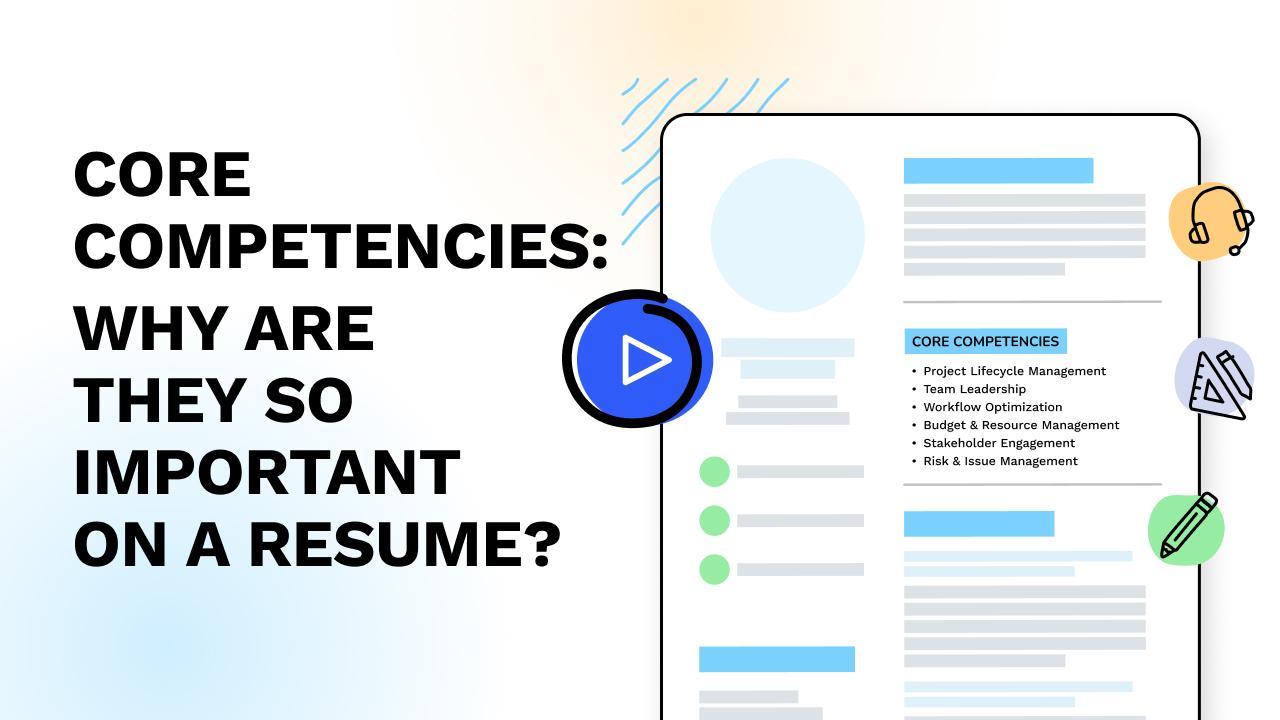Core competencies are key to a successful career. They are your best professional abilities, and they can help you make a positive impact in the workplace.
Employers know this, which is why having core competencies on your resume can help distinguish you from other candidates and give a better chance of landing your next job. Let’s explore how this is possible.
This Guide Will Show You:
- A comprehensive definition of core competencies.
- How to identify core competencies.
- 10 core competencies to add to your resume.
- Examples of core competency sections.
- Tips for adding competencies to your resume.

Want to Update Your Resume? Check out our Resume Builder, where you’ll get content suggestions based on your job title that you can add with one click to any of our recruiter-approved resume templates.
What Are Core Competencies?
Core competencies are a set of specific, demonstrable skills and expertise that are crucial to performing a particular job or function effectively.
These competencies often encompass a blend of technical abilities, soft skills, knowledge and behaviors that are essential for success in a specific role.
Therefore, core competencies can be both industry-specific, such as technical skills required in engineering, or more general, like leadership abilities or communication skills. This means you must be able to easily categorize your best professional traits.
Why Are Core Competencies Important?
Placing core competencies on your resume is important for the following reasons:
- They go directly beneath the header, making it a great strategy for drawing the hiring manager’s attention to specific qualifications.
- They’re a great way to include more keywords from the job description.
- They make your resume more ATS-friendly by clearly establishing your qualifications.
- They summarize, at a high level, why your skill set makes you the best person for the job.
Overall, by adding core competencies to your resume you highlight your unique value that is specific to the job, establishing you as a prime candidate.
How to Identify Core Competencies + Examples
If core competencies are so important to the operation of a business, then they’re important for your job search. Your resume should reflect the qualities that give companies an edge in the market.
But how do you identify them? A case study from tech will give us some insight.
Core Competencies Case Study — Google
The question you should always ask yourself when identifying core values is: What sets the company apart?
For example, Google established its commanding position in the tech world through disruption and innovation.
Google played a significant role in setting our expectations for advanced search engines and efficient web services. They’ve created a comprehensive ecosystem of products and services, all designed and executed in the spirit of rapid, continuous innovation.
From their renowned search engine to their Android devices, Google is one of the most universally recognized tech companies because they make great products. When you put it all together, it’s easy to see why they are the envy of others in their industry.
Once you have a comprehensive view of Google, you can sum up its competencies in a few words:
- Innovation
- Product sense
- Agility
- Creativity
How do you do this when you don’t have a case study in front of you? If a company doesn’t outright state its competencies, you can figure them out by taking these steps:
- Read up on the mission.
- Read the job description.
- Observe market performance.
- Understand the competitive landscape.
- Pay attention to public statements.
Sometimes simply doing an online search of the company’s name with “core competencies” will tell you something about its values. For example, you may be told ahead of time that you will be assessed on the following:
- Adaptability
- Collaboration
- Customer focus
- Organization
- Drive for results
- Influencing for impact
- Judgment
In which case you will want to do your best to tailor your resume around these qualities.
Many other organizations list their competencies. Before you connect with one of them, you should search online to see if they have their own list.
But the question persists — why should job seekers care about this? Ultimately, core competencies influence a company’s hiring decisions. To improve your chances of getting the interview, their core competencies should be reflected in your resume.
As a job seeker, what you want to do is simple — understand what your target company values, then translate these values into core competencies for your resume.
Now, let’s see what that looks like in action.
11 Core Competencies for Your Resume
Deciding which core competencies are right for your resume shouldn’t be done off the top of your head and done. You should always look at the duties and responsibilities portion of the job ad to see the skills and keywords they cite, then tailor your resume to address them.
Nevertheless, some core competencies have a broad utility in the job market, so we’ve put together a list of the most popular. Use the list as a source of inspiration as you write your resume.
Leadership
Few core competencies will help you get further ahead in your career than leadership, an ability valued in every industry and career field.
Skills Associated With This Core Competency:
- Employee motivation
- Strategic thinking
- Decision-making
- Taking initiative
- Mentorship
Communication
Communication is nearly always a core competency worth highlighting. Many people, from high-level executives to customer service representatives, use this talent daily.
Skills Associated With This Core Competency:
- Storytelling
- Public speaking
- Active listening
- Email etiquette
- Open-mindedness
Administrative
The ability to execute administrative tasks isn’t only valuable to administrative assistants. Whether you’re planning events or managing your team’s schedule, this core competency will be appreciated.
Skills Associated With This Core Competency:
- Scheduling
- Microsoft Office
- Google Workspace
- Data entry
- Words per minute (WPM) typing speed
Problem-solving
Every company benefits from having a few problem-solvers on staff. Managers need multiple, carefully thought-out solutions to every problem presented to them, making this competency highly desirable.
Skills Associated With This Core Competency:
- Troubleshooting
- Data analysis
- Critical thinking
- Research
- Solution design
Creativity
When there’s not a clear answer to a question, creativity comes in handy. In a job market with similarly skilled candidates, creative job seekers will stand out for their ability to think outside the box.
Skills Associated With This Core Competency:
- Creative direction
- Innovation
- Design sense
- Curiosity
- Visual thinking
Interpersonal Skills
Your career will be defined, in part, by how you work with other people. Interpersonal skills are the personality traits that benefit your colleagues and the organization, a core competency your co-workers will thank you for.
Skills Associated With This Core Competency:
- Friendliness
- Empathy
- Conflict resolution
- Diplomacy
- Counseling
Computer Skills
Nowadays, computer skills are necessary for moving up in the workplace, and the core competencies section is the perfect place to highlight your abilities.
Skills Associated With This Core Competency:
- IT knowledge
- Programming languages like Python, HTML or JavaScript
- Spreadsheets
- Software development
- Cloud computing
Collaboration
Working well with others is an important part of most workplaces, and collaborating effectively contributes to business success. As a core competency, it suggests you’d be a valuable co-worker and employee.
Skills Associated With This Core Competency:
- Relationship-building
- Teamwork
- Giving constructive feedback
- Inclusivity
- Adaptability
Customer service
Whether you work in a call center or on a sales floor, providing top-notch customer service is a core competency that sets you apart from other candidates.
Skills Associated With This Core Competency:
- Customer relationship management (CRM) software
- Persuasive speaking
- Patience
- Product knowledge
- Emotional intelligence
Marketing
Some level of marketing know-how is becoming increasingly required outside marketing departments, so don’t be shy about touting your marketing genius as one of your core competencies.
Skills Associated With This Core Competency:
- Search engine optimization or marketing (SEO/SEM)
- Email automation
- Social media
- Digital advertising
- Content management system (CMS) experience
Project Management
Many employers seek the ability to manage projects, because it reassures them that you can be trusted to see projects through to completion and contribute to the company’s overall success.
Skills Associated With This Core Competency:
- Task coordination
- Resource management
- Risk assessment
- Goal setting
- Evaluation
Now, let’s look at a few examples of a core competencies section in real-world resumes.
Core Competencies Examples
What does the core competencies section look like in action? Here are examples from four different careers.
Teacher Core Competencies
Kyra Coburn(555) 555-5555
example@example.com
Core competencies: Adaptability | Mentorship | Written and Verbal Communication | Lesson Planning | Presentation Skills
Sales Representative Core Competencies
Maya Watkins(555) 555-5555
example@example.com
Core competencies: Customer Service | Active Listening |Sales Techniques | Customer Database Management | Marketing
Registered Nurse Core Competencies
Matthew Ross(555) 555-5555
example@example.com
Core competencies: Collaboration | Empathy | Patient Care | Evidence-based Practice | Safety Protocols
Graphic Designer Core Competencies
Brandon Davidson(555) 555-5555
example@example.com
Core competencies: Creativity | Attention to Detail | Adaptability | Time Management | Communication
Resume Format for Core Competencies
Before we conclude, let’s address an important issue: which resume format is best for highlighting core competencies?
The most traditional resume format — the chronological resume — tends to put a professional summary in the most prominent position. For highlighting core competencies, we’d recommend using a skills-oriented format like combination or functional instead.
There’s one final question to address — how do key skills differ from competencies?
Core Competencies vs. Key Skills
You may be wondering how core competencies and key skills differ since, on the surface, they sound pretty similar. While they have a lot in common, here is a simple way to understand the difference:
- Scope: Key skills are specific hard and soft skills that a job requires. Skills can get as finely-grained as operating construction equipment or programming in a niche computer code. Core competencies are groups of skills. They are umbrella terms that encapsulate a broader skill set. For example, computer programming is a core competency. JavaScript, HTML and Python would count as skills.
- Context: Core competencies are usually tied to a particular role or industry, reflecting the strategic strengths required for that position. Key skills can be more general and applicable across various roles.
- Impact: Core competencies are often linked to long-term success and leadership within a role, whereas key skills are necessary for day-to-day tasks and operations.
3 Tips for Core Competencies
TIP 1
Inventory Your Traits
You have to understand your strengths before you write a core competencies section. How do you do that? Review your (current and previous) job descriptions, reflect on your work experience and start jotting down your day-to-day tasks.
As you make this list, you will begin to see themes that could be labeled as “core competencies.” For example, if you manage projects, mentor younger co-workers and plan strategy, then “leadership” is one of your core competencies.
Finally, chat with co-workers to see how you are perceived in the workplace. Personal traits like friendliness, adaptability and compassion may not appear in the job description, but they are essential core competencies that will help others understand your career.
TIP 2
Be Concise
Many sections that kick off a resume — objective statements, for example — are short and to the point. Hiring managers only spend about seven seconds glancing at a resume before deciding whether to take a closer look.
Use bullet points or vertical lines to break up your core competencies list into distinct items, and only list your most significant strengths. Save the rest for your skills and work experience sections.
TIP 3
Tailor Them to the Job
Every job requires different skills, so you should return to your core competencies every time you apply.
For example, let’s say you’re applying for a job in retail and you’re considering two different companies. The first listing emphasizes customer service while the second focuses on sales techniques. You may want to tweak your resume to ensure you touch on the right keywords in each application.
Was this information about Core Competencies On A Resume [+ Examples] helpful? Let us know!
Don is a Certified Professional Resume Writer (CPRW) with more than 10 years’ experience creating digital content, including four years helping job seekers develop their careers. He holds an M.S. in Journalism from Northwestern University.
More resources
![What Should a Resume Look Like in 2025? [+ Example] What Should a Resume Look Like in 2025? [+ Example]](/sapp/uploads/2024/08/what-should-a-resume-look-like-hero.png)
What Should a Resume Look Like in 2025? [+ Example]
A good-looking resume will always use simple fonts and an easy...

25 Common Job Interview Questions and Answers for 2025
Prepare for the interview with examples of some of the most co...

5 of the Best Resume Writing Services You Can Try Today
Discover the best professional resume writing services with th...

Federal Resume: Examples, Templates and Tips
As a federal employee your resume must stand out to capture t...

Nursing Student Resume: Examples, Templates & Tips for 2025
As a nursing student you need a resume that showcases your cl...

Scholarship Resume: Examples, Template & How-to Guide
As a scholarship applicant you need a resume that highlights ...
